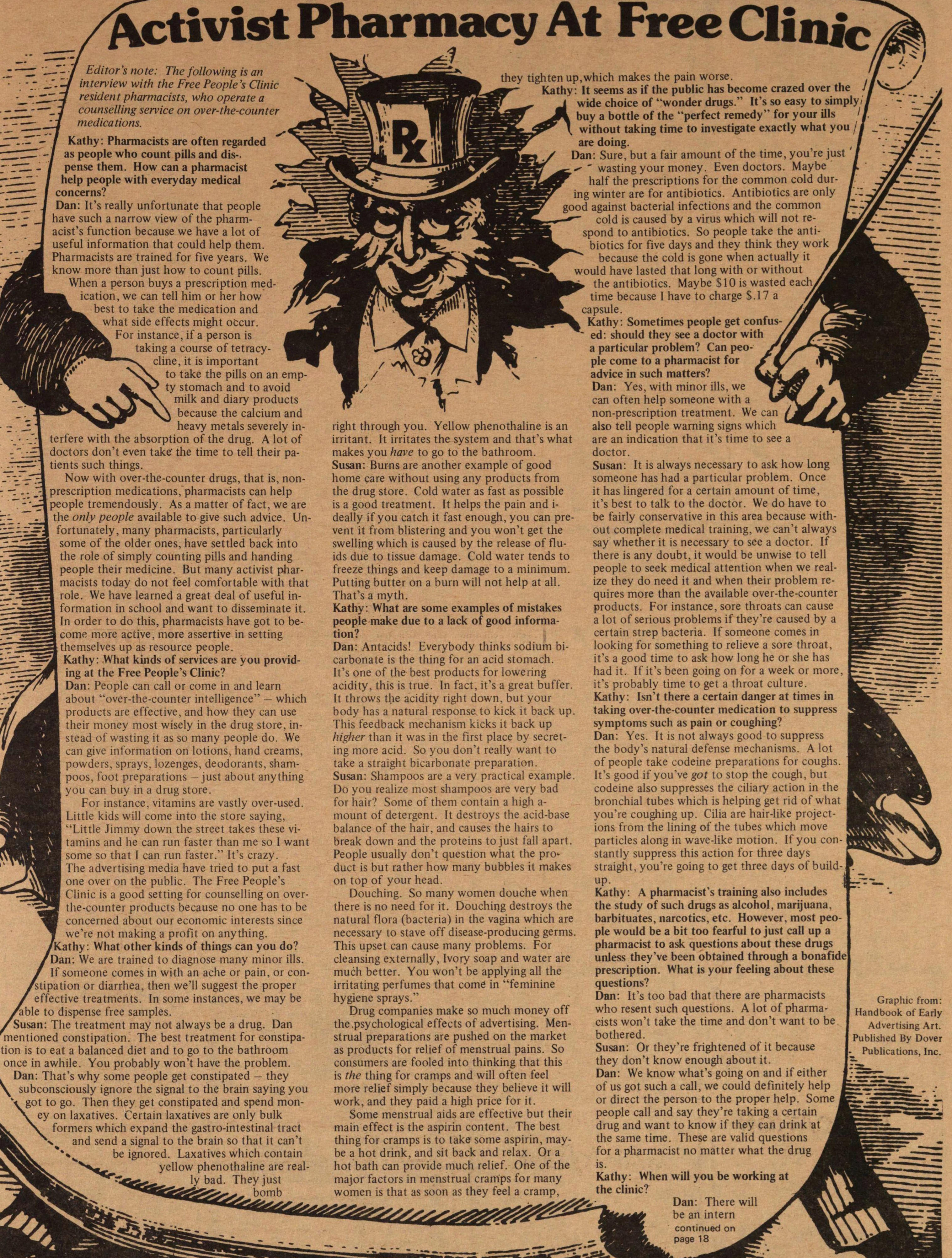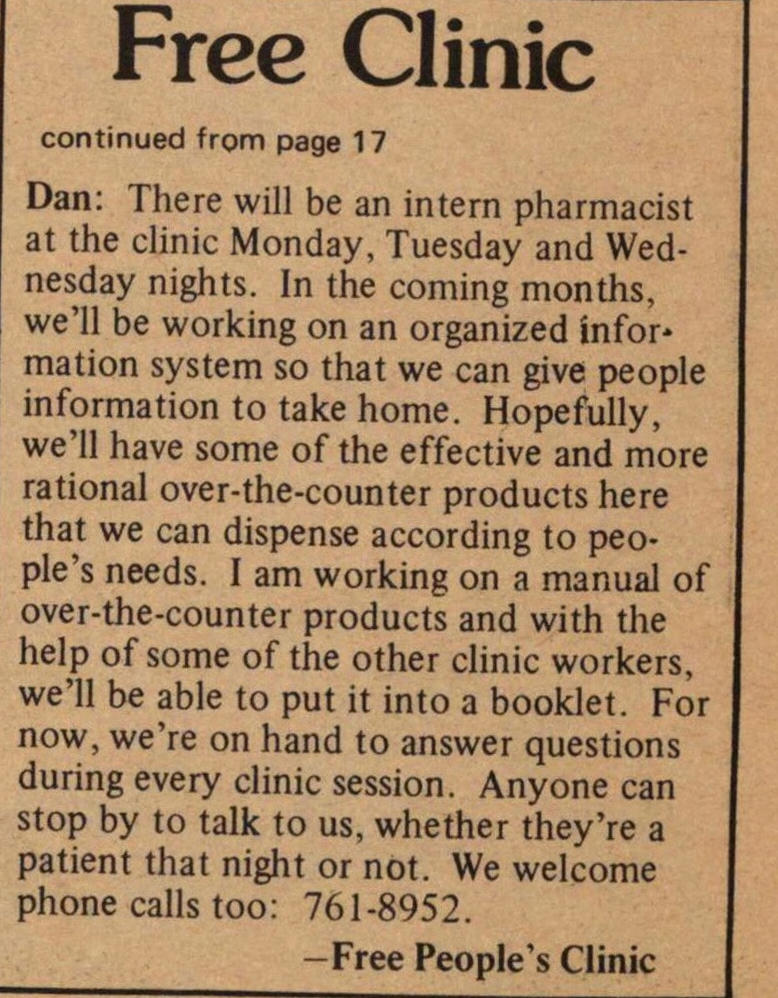Activist Pharmacy At Free Clinic


Activist Pharmacy At Free Clinic
Editor's note: The following is an interview with the Free People's Clinic resident pharmacists, who operate a counselling service on over-the-counter medications.
Kathy: Pharmacists are often regarded as people who count pills and dispense them. How can a pharmacist help people with everyday medical concerns?
Dan: It's really unfortunate that people have such a narrow view of the pharmacist's function because we have a lot of useful information that could help them. Pharmacists are trained for five years. We know more than just how to count pills. When a person buys a prescription medication, we can tell him or her how best to take the medication and what side effects might occur. For instance, if a person is taking a course of tetracycline, it is important to take the pills on an empty stomach and to avoid milk and diary products because the calcium and heavy metals severely interfere with the absorption of the drug. A lot of doctors don't even take the time to tell their patients such things.
Now with over-the-counter drugs, that is, non-prescription medications, pharmacists can help people tremendously. As a matter of fact, we are the only people available to give such advice. Unfortunately, many pharmacists, particularly some of the older ones, have settled back into the role of simply counting pills and handing people their medicine. But many activist pharmacists today do not feel comfortable with that role. We have learned a great deal of useful information in school and want to disseminate it. In order to do this, pharmacists have got to become more active, more assertive in setting themselves up as resource people.
Kathy: What kinds of services are you providing at the Free People's Clinic?
Dan: People can call or come in and learn k about "over-the-counter intelligence" -- which products are effective, and how they can use their money most wisely in the drug store, instead of wasting it as so many people do. We I can give information on lotions, hand creams, powders, sprays, lozenges, deodorants, shampoos, foot preparations -- just about anything you can buy in a drug store.
For instance, vitamins are vastly over-used. Little kids will come into the store saying, "Little Jimmy down the street takes these vitamins and he can run faster than me so I want some so that I can run faster." It's crazy. The advertising media have tried to put a fast one over on the public. The Free People's Clinic is a good setting for counselling on over-the-counter products because no one has to be concerned about our economic interests since we're not making a profit on anything.
Kathy: What other kinds of things can you do?
Dan: We are trained to diagnose many minor ills. If someone comes in with an ache or pain, or constipation or diarrhea, then we'll suggest the proper effective treatments. In some instances, we may be able to dispense free samples.
Susan: The treatment may not always be a drug. Dan mentioned constipation. The best treatment for constipation is to eat a balanced diet and to go to the bathroom once in awhile. You probably won't have the problem.
Dan: That's why some people get constipated -- they subconsciously ignore the signal to the brain saying you got to go. Then they get constipated and spend money on laxatives. Certain laxatives are only bulk formers which expand the gastro-intestinal tract and send a signal to the brain so that it can't be ignored. Laxatives which contain yellow phenothaline are really bad. They just bomb right through you. Yellow phenothaline is an irritant. It irritates the system and that's what makes you have to go to the bathroom.
Susan: Burns are another example of good home care without using any products from the drug store. Cold water as fast as possible is a good treatment. It helps the pain and ideally if you catch it fast enough, you can prevent it from blistering and you won't get the swelling which is caused by the release of fluids due to tissue damage. Cold water tends to freeze things and keep damage to a minimum. Putting butter on a burn will not help at all. That's a myth.
Kathy: What are some examples of mistakes people make due to a lack of good information?
Dan: Antacids! Everybody thinks sodium bicarbonate is the thing for an acid stomach. It's one of the best products for lowering acidity, this is true. In fact, it's a great buffer. It throws the acidity right down, but your body has a natural response to kick it back up. This feedback mechanism kicks it back up higher than it was in the first place by secreting more acid. So you don't really want to take a straight bicarbonate preparation.
Susan: Shampoos are a very practical example. Do you realize most shampoos are very bad for hair? Some of them contain a high amount of detergent. It destroys the acid-base balance of the hair, and causes the hairs to break down and the proteins to just fall apart. People usually don't question what the product is but rather how many bubbles it makes on top of your head.
Douching. So many women douche when there is no need for it. Douching destroys the natural flora (bacteria) in the vagina which are necessary to stave off disease-producing germs. This upset can cause many problems. For cleansing externally, Ivory soap and water are much better. You won't be applying all the irritating perfumes that come in "feminine hygiene sprays."
Drug companies make so much money off the psychological effects of advertising. Menstrual preparations are pushed on the market as products for relief of menstrual pains. So consumers are fooled into thinking that this is the thing for cramps and will often feel more relief simply because they believe it will work, and they paid a high price for it.
Some menstrual aids are effective but their main effect is the aspirin content. The best thing for cramps is to take some aspirin, maybe a hot drink, and sit back and relax. Or a hot bath can provide much relief. One of the major factors in menstrual cramps for many women is that as soon as they feel a cramp, they tighten up, which makes the pain worse.
Kathy: It seems as if the public has become crazed over the wide choice of "wonder drugs." It's so easy to simply buy a bottle of the "perfect remedy" for your ills without taking time to investigate exactly what you are doing.
Dan: Sure, but a fair amount of the time, you're just wasting your money. Even doctors. Maybe half the prescriptions for the common cold during winter are for antibiotics. Antibiotics are only good against bacterial infections and the common cold is caused by a virus which will not respond to antibiotics. So people take the antibiotics for five days and they think they work because the cold is gone when actually it would have lasted that long with or without the antibiotics. Maybe $10 is wasted each time because I have to charge $.17 a capsule.
Kathy: Sometimes people get confused: should they see a doctor with a particular problem? Can people come to a pharmacist for advice in such matters?
Dan: Yes, with minor ills, we a can often help someone with a non-prescription treatment. We can also tell people warning signs which are an indication that it's time to see a doctor.
Susan: It is always necessary to ask how long someone has had a particular problem. Once it has lingered for a certain amount of time, it's best to talk to the doctor. We do have to be fairly conservative in this area because without complete medical training, we can't always I say whether it is necessary to see a doctor. If there is any doubt, it would be unwise to tell people to seek medical attention when we realize they do need it and when their problem requires more than the available over-the-counter products. For instance, sore throats can cause a lot of serious problems if they're caused by a certain strep bacteria. If someone comes in looking for something to relieve a sore throat, it's a good time to ask how long he or she has had it. If it's been going on for a week or more, it's probably time to get a throat culture.
Kathy: Isn't there a certain danger at times in taking over-the-counter medication to suppress symptoms such as pain or coughing?
Dan: Yes. It is not always good to suppress the body's natural defense mechanisms. A lot of people take codeine preparations for coughs. It's good if you've got to stop the cough, but codeine also suppresses the ciliary action in the bronchial tubes which is helping get rid of what you're coughing up. Cilia are hair-like projections from the lining of the tubes which move particles along in wave-like motion. If you constantly suppress this action for three days straight, you're going to get three days of build-up.
Kathy: A pharmacist training also includes the study of such drugs as alcohol, marijuana, barbiturates, narcotics, etc. However, most people would be a bit too fearful to just call up a pharmacist to ask questions about these drugs unless they've been obtained through a bonafide prescription. What is your feeling about these questions?
Dan: It's too bad that there are pharmacists who resent such questions. A lot of pharmacists won't take the time and don't want to be bothered.
Susan: Or they're frightened of it because I they don't know enough about it.
Dan: We know what's going on and if either of us got such a call, we could definitely help or direct the person to the proper help. Some people call and say they're taking a certain drug and want to know if they can drink at the same time. These are valid questions for a pharmacist no matter what the drug is.
Kathy: When will you be working at the clinic?
Dan: There will be an intern
continued on page 18
Free Clinic
continued from page 17
Dan: There will be an intern pharmacist at the clinic Monday, Tuesday and Wednesday nights. In the coming months, we'll be working on an organized information system so that we can give people information to take home. Hopefully, we'll have some of the effective and more rational over-the-counter products here that we can dispense according to people's needs. I am working on a manual of over-the-counter products and with the help of some of the other clinic workers, we'll be able to put it into a booklet. For now, we're on hand to answer questions during every clinic session. Anyone can stop by to talk to us, whether they're a patient that night or not. We welcome phone calls too: 761-8952.
--Free People's Clinic
Graphic from: Handbook of Early Advertising Art. Published by Dover Publications, Inc.
Article
Subjects
Freeing John Sinclair
Old News
Ann Arbor Sun